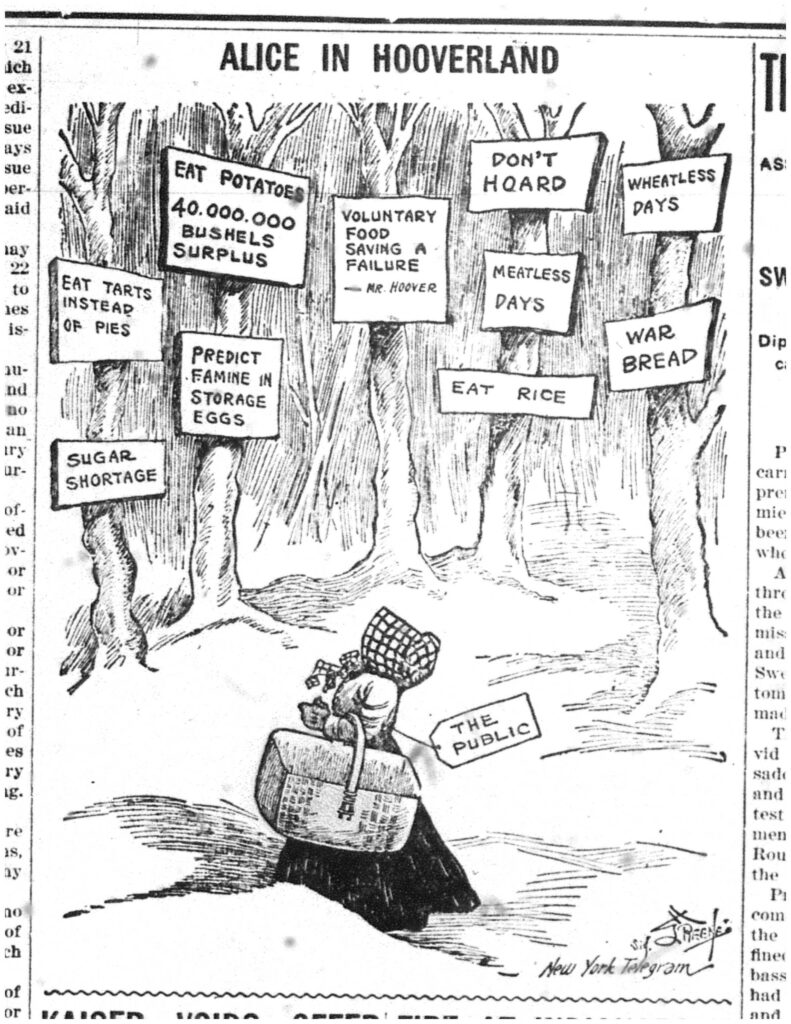WWI — February 1918, things were rough all over

One hundred and seven years ago the War to End All Wars was raging in Europe. Our doughboys were on their way to the front. Some had already made it to France, others never made it out of camp, struck down by disease. At home commodities were scarce, as were jobs and money. Set the way-back machine to February 1918 and watch out for all those dark clouds.
On January 17, 1918 a new edict came out of Washington, D. C. We read about it in the Wilmington Advocate. “The next ten Mondays are declared legal holidays. In addition, for 5 days, beginning Friday, every industry in the United States east of the Mississippi River, including even the war industries, must close down. The states of Minnesota and Louisiana are included.”
“This is the command in the most drastic and sweeping fuel priority law ever issued by the government. Its purpose is to meet the coal famine.”
“The same order fixes every Monday from January 28 to March 25, inclusive, as a holiday. On such days all theaters and other places of amusement must close. Other nonessential business must curtail their activities.”
Private homes were also affected, making Mondays “heatless Mondays,” unless there was a medical need for heat in the home.
Wilmington Public Library tried to mitigate the situation with this notice, “The Public Library is warm and comfortable, with all the late magazines, and books of interest, to everyone. Spend your heatless Mondays there. You will be welcome.”
Another edict had gone out stipulating that all people of German descent, not yet naturalized, would have to register as an enemy alien. “In accordance with the President’s proclamation dated Nov. 16, 1917, all male German alien enemies of 14 years of age and upward, residing in this postoffice district are required to register under the direction of the postmaster, who has been appointed assistant registrar.”
“This registration commences at 6 a.m. on Feb. 4, 1918 and continues each day successively thereafter, between the hours of 6 a.m. and 8 p.m., up to and including the 9th day of February, 1918 at 8 p.m.”
“All natives, citizens, denizens, or subjects of the German empire, or Imperial German government, being males of the age of 14 years and upwards, who are within the United States and not actually naturalized as American citizens are required to register as alien enemies. The fact of having first or declarant papers, or a permit for restricted zones issued by the United States Marshal, does not exempt the possessor thereof from registering as a German alien enemy.”
“German alien enemies are hereby directed to report to the postoffice located in the district in which they reside.”
“Each German alien enemy is required to bring with him to the place of registration four photographs not larger than 3 x 3 inches, on thin paper with a light background. At the place of registration he will be given full instructions as to procedure in filing application for registration.”
“An alien enemy required to register and who fails to complete his registration within the time fixed therefor, In addition to all other penalties prescribed by law, is liable to restraint, imprisonment and detention for the duration of the war. W. B. Carlile, Chief Registrar, For the Nonurban areas in the Northern District of Illinois.”
As many recruits as could, visited their home one last time, “Charles H. Martin, eldest son of the late James W. Martin, former Will Count State’s Attorney, visited his uncle John Linton on Sunday last. Mr. Martin enlisted in the Signal Corps last December and has been located at the Second Regiment armory ever since. He is now adjutant of the 415th Railroad Telegraphers Battalion, with the rank of first lieutenant.”
And, “Case Van Duyne, after a few days furlough, which he spent in this place with his parents, Mr. and Mrs. P. Van Duyne, returned Sunday to Jefferson Barracks.”
At the front things were getting rough as well. Ronald Jardine, in France with the English hospital corps, wrote home describing one of his rough days. “Was on guard last night and had a rough night, too. We had a convoy of nearly a hundred stretchers at about 6:30 p.m. Instead of carrying stretchers I had to unstrap them.”
“I was stationed down the road a short distance from the reception tent, where all cases enter the hospital and assigned to wards. When an ambulance came rolling up the road I had to follow it on the run, open up the back curtains, let down the rear step and unstrap the stretchers before the ambulance arrived at the reception tent, so that it might be unloaded immediately upon its arrival there.”
“Some of the ambulances would scarcely creep along and others would “scoot” by at pretty good speed. It’s a good thing there was no ice on the road for I’m afraid I should have broken my neck a couple of times. After I had hopped into one of the speedy cars a Canadian made a remark that the old bus was just like a tank going over the top.”
“Although it was a cloudy night the big searchlights about here threw their piercing shafts of light into the clouds. They seemed anxious to spot a Roche Zeppelin or aeroplane.”
“This convoy finished at 7:30 a.m. I was on duty in the ward until 9. Got to bed at 10. Pulled out for evacuation of 34 at 11:40 which lasted until 1:30 a.m. After spending two hours tour duty, from 2:30 to 4:30 I managed to snatch a few moments sleep before revile. Was good for nothing all day today. Got a little sleep this afternoon and am hoping to get a good night’s rest tonight. I close with love to all. Ronald Jardine”
Sandy Vasko is Director of the Will County Historical Museum & Research Center and President of the Will County Historical Society.
